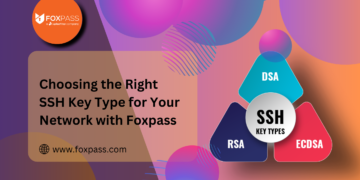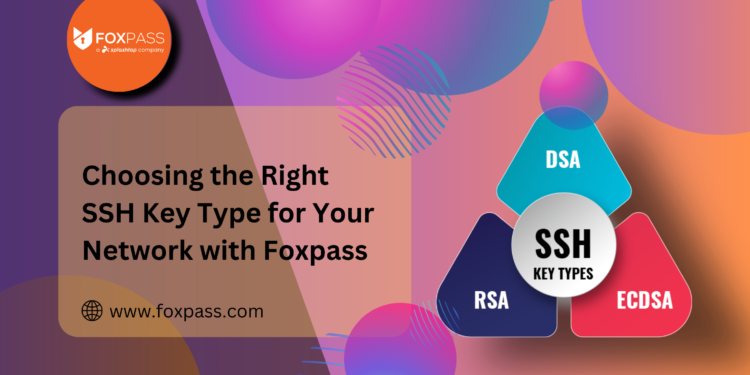Introduction:
SSH (Secure Shell) is a widely used cryptographic network protocol that allows secure remote access and communication between computers. One of the fundamental aspects of SSH security is the use of cryptographic keys for authentication. These keys come in different types, each offering unique security features. When integrating SSH with Foxpass, a cloud-based identity and access management service, selecting the appropriate SSH Key Type becomes a critical decision for ensuring robust network security.
1. RSA (Rivest-Shamir-Adleman):
RSA keys are the most prevalent and widely used type of SSH key. They are renowned for their strong security, often employing key lengths ranging from 2048 to 4096 bits. RSA keys offer an excellent balance between security and performance, making them highly compatible with a broad range of SSH clients and servers. This popularity and compatibility have made RSA a trusted choice for securing remote access and communication over SSH across various systems and networks.
2. DSA (Digital Signature Algorithm):
Due to certain vulnerabilities, DSA keys, which were once commonly used in the past, have experienced a decline in popularity. As a result, they have been largely replaced by RSA keys, which offer stronger security and better performance. For most modern SSH implementations, it is generally advised to avoid using DSA keys unless there is a specific requirement for compatibility with legacy systems that do not support RSA. Opting for RSA keys enables users to benefit from improved security and wider compatibility, resulting in a more robust and secure network environment.
3. ECDSA (Elliptic Curve Digital Signature Algorithm):
ECDSA keys are well-regarded for their robust security despite having smaller key sizes compared to RSA. This efficiency is one of the main reasons they have gained popularity and become a favored choice for modern systems. Their ability to deliver strong security with shorter key lengths makes ECDSA a valuable option for securing remote access and communication in contemporary environments, especially where resource efficiency and performance are critical considerations.
Choosing the Right SSH Key Type:
Security Requirements: Assess the level of security required for your network. Larger key sizes generally provide better security but may impact performance.
Compatibility: Check the compatibility of SSH key types with your existing infrastructure, systems, and SSH clients.
Performance: Consider the performance implications of different key types, especially for systems with heavy SSH usage.
Key Management: Evaluate how easily you can manage and rotate keys for different users within the Foxpass environment.
Future-Proofing: Choose key types that are considered secure for the foreseeable future to avoid frequent key changes.
Audit and Monitoring: Ensure that your chosen key type aligns with your network’s auditing and monitoring requirements.
Configuring SSH Key Types:
With the ability to create key types and tag SSH keys accordingly, you can enable SSH key types to filter the keys returned to specific hosts. Foxpass allows you to set up rulesets that dictate which key types should be returned to particular hosts.
To leverage AWS-based matching features, connect your AWS account by adding your connection info here. Key types offer the ability to filter hosts based on various parameters, including hostname, AWS Connection Name, AWS VPC ID, AWS Subnet ID, or AWS Tag.
To determine a host’s association with a key type, Foxpass checks if it matches any or all of the rules configured in the key type, based on your rule settings. Each key type entry represents a specific subset of your servers. To achieve this, create key types for different environments, such as Production machines and QA machines. Matching rules use regular expressions in Perl format. When a user attempts SSH access to a host, Foxpass identifies the appropriate key type for that host and returns all the user’s keys associated with that key type.
Conclusion:
By carefully considering these factors and understanding the strengths and weaknesses of each SSH key type, you can make an informed decision when choosing the right SSH key type for your network with Foxpass. Implementing the appropriate key type will contribute significantly to maintaining a secure and efficient network infrastructure.
























































